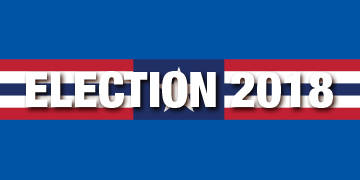Two Big Island legislative incumbents are raising less money than their challengers, while most are socking away solid funding advantages compared with those running against them.
That’s according to an analysis of June 30 reports local candidates filed last week with the state Campaign Spending Commission. The analysis looked at total money raised for the election cycle, amount remaining June 30 and how much money came in increments of $100 or less compared with larger contributions.
In what last election was one of the closest nail-biters, the House District 7 Democratic primary race, David Tarnas, who again is challenging incumbent Rep. Cindy Evans, has raised $38,585 to Evans’ $17,883. More of Evans’ money has come from donations of $100 or less, while all of Tarnas’ big contributions of more than $1,000 came from the district he wants to represent.
“I think the fact that I have raised significantly more than she has demonstrates that the level of support I have in the community is greater than hers,” Tarnas said Monday.
Tarnas, who came within 176 votes of beating Evans in 2016, also has more money left to work with, just less than a month before the Aug. 11 primary. The winner faces Tom Belekanich, a virtually unknown Republican, in the general election.
In the House District 5 race, challenger Jeanne Kapela has raised $17,638 to incumbent Rep. Richard Creagan’s $13,640. Both candidates report that about 17 percent of their contributions are coming in donations of $100 or less.
Creagan, however, had more money to spend as of June 30, with a war chest of $14,084 to Kapela’s $4,724. He said Monday he’s still raising money and plans to continue an aggressive campaign.
Also on the Democratic primary ballot, Gene “Bucky” Leslie reports no contributions as of June 30. With only Democrats in the race, the election will be decided in the primary.
Creagan’s largest contributions came from fellow physicians and a state medical political action group; Kapela’s came from unions and District 1 state Rep. Mark Nakashima.
“I’m humbled by all of the support that I’ve received for my campaign,” Kapela said in a statement. “We’ve received thousands of dollars in new contributions since July 1, too, showing that our campaign’s message is building momentum throughout the West Hawaii community.”
One incumbent who’s having no problem raising money is District 4 Sen. Lorraine Inouye, who leads the legislative money race on the Big Island with $223,660 reported. That compares with challenger Heather Kimball’s $52,298 in a winner-take-all Democratic primary.
Inouye’s big money comes from unions, PACs, farmers and energy businesses, which she helps regulate as chairwoman of the Senate Transportation and Energy Committee. Kimball’s $1,000-plus contributions came from family members, teachers and an architectural firm.
Inouye said contributions don’t influence her vote.
“In all the years that I’ve been in office, I have not made any commitments with regards to any donations that I have received,” Inouye said during a candidate forum last month. “I believe how I have handled my positions as your state senator, is true of bills that I support as well as bills that I oppose. There’s no strings attached to any contributions.”
Only 5 percent of Inouye’s money came from donations of $100 or less compared with Kimball’s 28 percent.
“All of my donations are from individuals. I haven’t taken any corporate PAC money,” Kimball said.
Still, she said, she’d accept some PAC or union money if the cause was aligned with her values.
The only other Big Island candidate reporting contributions in six figures is District 1 incumbent Sen. Kai Kahele, who has no Democratic primary opponent and faces Libertarian Kimberly Arianoff in the general. Arianoff reported no campaign contributions compared with Kahele’s $126,663.
Only 4 percent of Kahele’s contributions came in increments of $100 or less.
Kahele doesn’t see big contributions as a bad thing. He acknowledges that a flurry of support from the hospitality industry came after he fought an increase in the transient accommodations taxes paid by hotels.
“I was such a staunch supporter of not raising the TAT; I appreciate their support and I think it’s because they know I was willing to stand up for them,” he said.
“That’s always been the way political campaigns in Hawaii have run. … The first sign of the true strength of a campaign is the candidate’s ability to raise money, that people believe in their message and what they stand for,” Kahele added. “I wish we could have elections and campaigns that had no money raised. … It costs money to run a campaign. … It’s the way we’ve always done it in Hawaii.”
Email Nancy Cook Lauer at ncook-lauer@westhawaiitoday.com.





